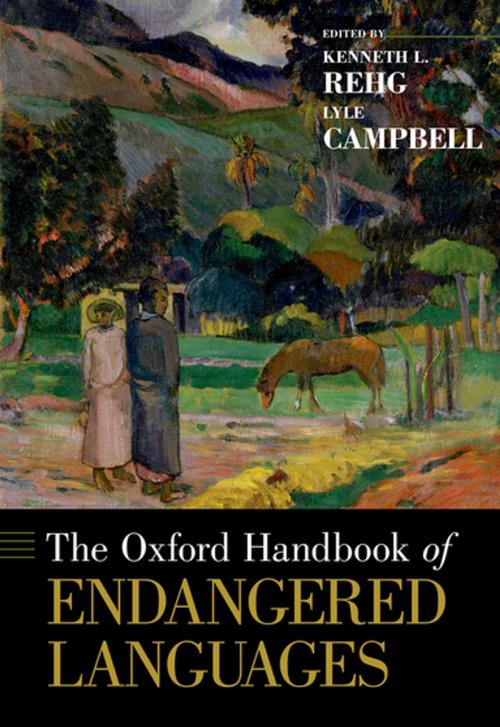The Oxford Handbook of Endangered Languages
Nonfiction, Reference & Language, Language Arts, Linguistics, Social & Cultural Studies, Social Science, Anthropology| Author: | ISBN: | 9780190877040 | |
| Publisher: | Oxford University Press | Publication: | July 18, 2018 |
| Imprint: | Oxford University Press | Language: | English |
| Author: | |
| ISBN: | 9780190877040 |
| Publisher: | Oxford University Press |
| Publication: | July 18, 2018 |
| Imprint: | Oxford University Press |
| Language: | English |
The endangered languages crisis is widely acknowledged among scholars who deal with languages and indigenous peoples as one of the most pressing problems facing humanity, posing moral, practical, and scientific issues of enormous proportions. Simply put, no area of the world is immune from language endangerment. The Oxford Handbook of Endangered Languages, in 39 chapters, provides a comprehensive overview of the efforts that are being undertaken to deal with this crisis. A comprehensive reference reflecting the breadth of the field, the Handbook presents in detail both the range of thinking about language endangerment and the variety of responses to it, and broadens understanding of language endangerment, language documentation, and language revitalization, encouraging further research. The Handbook is organized into five parts. Part 1, Endangered Languages, addresses the fundamental issues that are essential to understanding the nature of the endangered languages crisis. Part 2, Language Documentation, provides an overview of the issues and activities of concern to linguists and others in their efforts to record and document endangered languages. Part 3, Language Revitalization, includes approaches, practices, and strategies for revitalizing endangered and sleeping ("dormant") languages. Part 4, Endangered Languages and Biocultural Diversity, extends the discussion of language endangerment beyond its conventional boundaries to consider the interrelationship of language, culture, and environment, and the common forces that now threaten the sustainability of their diversity. Part 5, Looking to the Future, addresses a variety of topics that are certain to be of consequence in future efforts to document and revitalize endangered languages.
The endangered languages crisis is widely acknowledged among scholars who deal with languages and indigenous peoples as one of the most pressing problems facing humanity, posing moral, practical, and scientific issues of enormous proportions. Simply put, no area of the world is immune from language endangerment. The Oxford Handbook of Endangered Languages, in 39 chapters, provides a comprehensive overview of the efforts that are being undertaken to deal with this crisis. A comprehensive reference reflecting the breadth of the field, the Handbook presents in detail both the range of thinking about language endangerment and the variety of responses to it, and broadens understanding of language endangerment, language documentation, and language revitalization, encouraging further research. The Handbook is organized into five parts. Part 1, Endangered Languages, addresses the fundamental issues that are essential to understanding the nature of the endangered languages crisis. Part 2, Language Documentation, provides an overview of the issues and activities of concern to linguists and others in their efforts to record and document endangered languages. Part 3, Language Revitalization, includes approaches, practices, and strategies for revitalizing endangered and sleeping ("dormant") languages. Part 4, Endangered Languages and Biocultural Diversity, extends the discussion of language endangerment beyond its conventional boundaries to consider the interrelationship of language, culture, and environment, and the common forces that now threaten the sustainability of their diversity. Part 5, Looking to the Future, addresses a variety of topics that are certain to be of consequence in future efforts to document and revitalize endangered languages.















